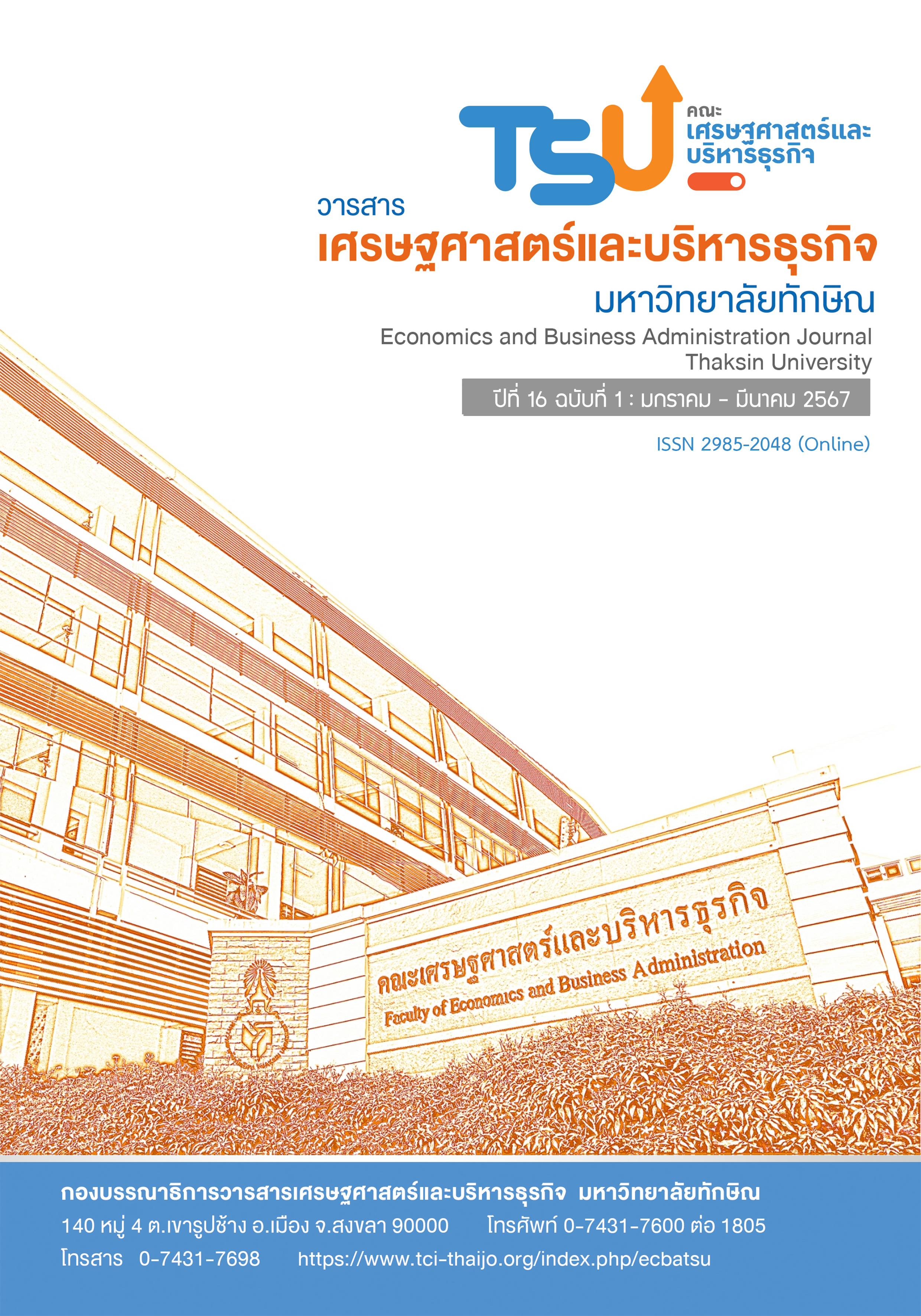The Influence of Transformational Leadership, Psychological Capital and Psychological Empowerment on Employees’ Innovative Work Behavior
DOI:
https://doi.org/10.55164/ecbajournal.v16i1.265518Keywords:
Transformational Leadership, Psychological Capital, Psychological Empowerment, Innovative Work BehaviorAbstract
The objective of this quantitative research was to study the influence of transformational leadership, psychological capital, and psychological empowerment on innovative work behavior. The population was employees at all levels of a petrochemical company in Map Ta Phut Industrial Estate, Rayong Province. A questionnaire was used to collect data from 342 employees by simple random sampling by lottery. The statistics used for data analysis included frequency, percentage, mean, standard deviation, skewness, kurtosis, correlation coefficient, and structural equation modeling (SEM). The proposed model was consistent with the empirical data, with model-fit indices of CMIN/DF = 1.985, GFI = 0.935, AGFI = 0.907, CFI = 0.980, RMSEA = 0.054, RMR = 0.012, and NFI = 0.960. The relationship could be explained by the fact that transformational leadership and psychological empowerment have a positive influence on innovative work behavior. Meanwhile, psychological capital has a positive influence on psychological empowerment. The variables in the model can explain the variance of an employee's innovative work behavior by 60.8 percent.
References
Afsar, B., Badir, Y. F., & Saeed, B. B. (2014). Transformational Leadership and Innovative Work Behavior. Industrial Management and Data Systems, 114(8), 1270-1300.
Aphinya, K. (2020). Industry Outlook 2020-2022: Petrochemicals (Online). https://www.krungsri.com/en/research/industry/industry-outlook/Petrochemicals/Petrochemicals/IO/io-petrochemicals-20, 30 April 2022.
Arslan, F. (2022). The Mediating Role of Psychological Empowerment on the Relationship between Innovative Work Behavior and Transformational Leadership in Food and Beverage Employees: A Research of Five Star Hotels in Antalya. Journal of Global Tourism and Technology Research, 3(1), 68-83. DOI: 10.54493/jgttr.1064470.
Awang, Z. (2015). SEM Made Simple: A Gentle Approach to Learning Structural Equation Modeling. Bangi: MPWS Rich Publication.
Bass, B. M., & Avolio, B. J. (1994). Improving Organizational Effectiveness through Transformational Leadership. London: SAGE Publications, Inc.
Best, J., & Kahn, J. V. (1993). Research in Education (7th ed.). Boston: Allyn and Bacon.
Byrne, B. M. (2010). Structural Equation Modeling with AMOS: Basic Concepts, Application, and Programming. New York: Routledge.
Chen, W., Zhu, X., Sun, S., Liao, S., & Guo, Z. (2021). The Impact of Employees' Psychological Capital on Innovative Work Behavior: The Chain Mediating Effect of Knowledge Donating and Knowledge Collecting. Frontiers in Psychology, 12, 53-65.
Cortina, J. M. (1993). What is Coefficient Alpha? An Examination of Theory and Applications. Journal of Applied Psychology, 78(1), 98-104.
De Jong, J., & Den Hartog, D. (2010). Measuring Innovative Work Behavior. Creativity and Innovation Management, 19(1), 23–36.
Diana, L. N., & Sudarma, K. (2021). The Effect of Emotional Intelligence and Transformational Leadership on Innovative Work Behavior with Psychological Empowerment as a Variable Mediation. Management Analysis Journal, 10(2), 223-232.
Fornell, C., & Larcker, D. F. (1981). Structural Equation Models with Unobservable Variables and Measurement Error: Algebra and statistics. Journal of Marketing Research, 18, 382-388.
Hair, J. F., Black, W. C., Babin, B. J., & Anderson, R. E. (2010). Multivariate Data Analysis (7th ed.). Upper Saddle River, NJ: Prentice Hall.
Haji, L., Valizadeh, N., & Karimi, H. (2022). The Effects of Psychological Capital and Empowerment on Entrepreneurial Spirit: The Case of Naghadeh County, Iran. International Journal of Finance and Economics, 27(1), 290-300.
Hassanzadegan, S., Bagheri, M., & Shojaei, P. (2019). The Relationship between Psychological Capital and Job Performance: The Mediating Role of Psychological Empowerment. International Journal of Behavioral Sciences, 13(3), 104-110.
Hsu, M. A., & Chen, F. H. (2015). The Cross-level Mediating Effect of Psychological Capital on the Organizational Innovation Climate–employee Innovative Behavior Relationship. The Journal of Creative Behavior, 51(2), 128-139.
Kline, R. B. (2005). Principles and Practice of Structural Equation Modeling (2nd ed.). New York: Guilford.
Iqbal, K., & Ahmad, M. H. (2017). Effect of Psychological Capital on Organizational Commitment: Mediating Role of Psychological Empowerment. Abasyn Journal of Social Sciences, Special Issue, 72-87.
Luthans, F., Avolio, B., Avey, J. B., & Norman, S. M. (2007). Psychological Capital: Measurement and Relationship with Performance and Job Satisfaction. Personnel Psychology, 60(3), 541–572.
Luthans, F., Youssef, C. M., & Avolio, B. J. (2007). Psychological Capital. New York: Oxford University.
Meehanpong, P., Ngamkham, N., & Mesakulthavon, S. (2016). A Causal Model of Knowledge Management of Patient Unit in General Hospital under Ministry of Public Health. Nursing Journal of the Ministry of Public Health, 26(3), 78-93.
Nasir, Halimatussakdiah, & Suryani, I. (2018). Psychological Empowerment, Innovative Work Behavior and Job Satisfaction. Advances in Economics, Business and Management Research (AEBMR), 92, 636-643.
Purwanto, A., Asbari, M., Hartuti, Setiana, Y. N., & Fahmi, K. (2021). Effect of Psychological Capital and Authentic Leadership on Innovation Work Behavior. International Journal of Social and Management Studies, 2(1), 1–13.
Sagnak, M., Kuruoz, M., Polat, B., & Soylu, A. (2015). Transformational Leadership and Innovative Climate: An Examination of the Mediating Effect of Psychological Empowerment. Eurasian Journal of Educational Research, 60, 149-162.
Santoso, H., Elidjen, Abdinagoro, S. B., & Arief, M. (2019). The Role of Creative Self-efficacy, Transformational Leadership, and Digital Literacy in Supporting Performance Through Innovative Work Behavior: Evidence from Telecommunications Industry. Management Science Letters, 9(13), 2305-2314.
Setiawan, R., Suryani, T., Tirsa, G., & Eliyana, A. (2020). Boosting Innovative Work Behavior on Local Branded Fashion: The Evidence from Indonesia. Utopía Y Praxis Latinoamericana, 25(1), 66-74.
Silpcharu, T. (2014). Research and Statistical Analysis by SPSS and AMOS. (15th ed.). Bangkok; Business R & D Ordinary Partnership.
Spreitzer, G. M. (1995). Psychological Empowerment in the Workplace: Dimensions, Measurement, and Validation. Academy of Management Journal, 38(5), 1442–1465.
Sriboonwong, L., Singchungchai, P., Aree, P., Pathumarak, N., & Chatdokmaiprai, K. (2021). Leadership and Innovative Work Behavior in Public Sector: A Systematic Review. The Southern College Network Journal of Nursing and Public Health, 8(1), 181-195.
Tsang, K. K., Du, Y., & Teng, Y. (2022). Transformational Leadership, Teacher Burnout, and Psychological Empowerment: A Mediation Analysis. Social Behavior and Personality, 50(1), e11041. DOI: 10.2224/sbp.11041
Downloads
Published
How to Cite
Issue
Section
License
Copyright (c) 2024 Faculty of Economics and Business Administration, Thaksin University

This work is licensed under a Creative Commons Attribution-NonCommercial-NoDerivatives 4.0 International License.




